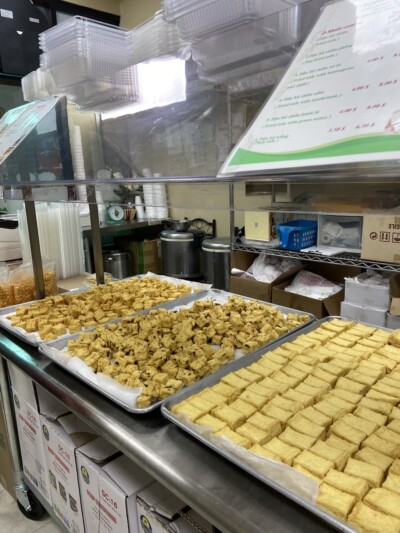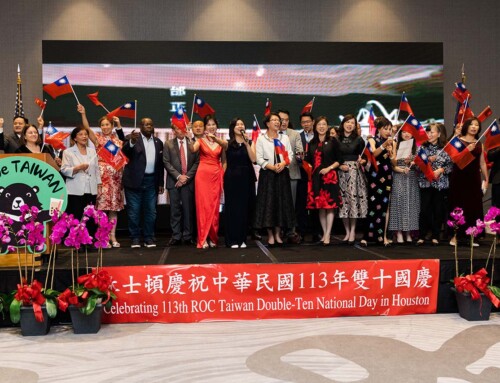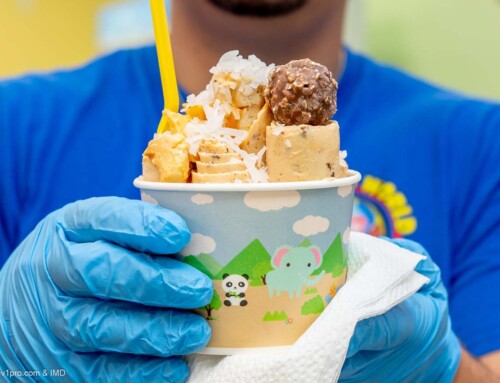
Lan Pham at work
Seven years ago, tired of layoffs in the oil industry, Lan Pham and her husband Khanh Nguyen began to dream of selling a product that’s been in steady demand for 2,000 years.
My husband’s family makes tofu in Vietnam,” Pham said. “His mother, his father, his uncle, his grandparents and their parents made it.”
In 2017, Pham and her husband themselves went into the business, launching what is now Thanh Tofu and Fast Food in Hong Kong City Mall in the International Management District.
Little more than a small cube itself, the shop is dominated by blocks of tofu. Refrigerators hold squares of uncooked tofu for cooking; bins and trolleys carry lightly fried tofu flecked with mushroom or lemon grass or still-hot, deep-fried chunks of tofu for snacking.
Loved by Asian cooks for its simple flavor, tofu actually is not simple to make. Pham starts each day boiling soy beans in metal vats before letting them coagulate, then straining and pressing the solids. Made just right, fresh tofu is juicy and springy, with a faint, pleasing hint of vegetable sweetness.
The secrets, Pham said, are very fresh soybeans – and vigilance.
“We always pay attention to quality,” she said. “When we fry the tofu, we change the oil a lot. I have to watch the employees, even the experienced ones, every day. I can smell and I can see if the cubes are burned a little, or if the oil is not fresh, or if the tofu is hard and not soft.”
 Customers can, too. Some drive in from New York and Mississippi with orders from hungry friends. Others drive in each week from Dallas.
Customers can, too. Some drive in from New York and Mississippi with orders from hungry friends. Others drive in each week from Dallas.
“They have tofu in Dallas,” Pham said “but they tell me it is not as good as ours, not like home.”
The shop’s wholesale clients are even more devoted. Every Monday and Thursday, Pham’s husband arrives at 3 a.m. to pack hundreds of boxes of tofu for Hong Kong Market, the mall’s grocery store down the hall, and several restaurant supply stores.
To prepare all this tofu, the family works in a commercial kitchen on which they’ve spent $100,000. The investment has already paid off in more ways than one, Pham said.
Seventeen years ago, when she and Nguyen arrived in the United States, they seized the first jobs they could find – each paying less than $10 an hour. Pham worked seven days a week at an industrial cable business. Nguyen worked 12-hour days in a machine shop, after which he drove straight to community college. Over the years, by learning new skills and working incessantly, the couple tripled their minimum-wage incomes.
Then both lost their jobs in layoffs – repeatedly.
After three downturn-related layoffs in a row, Pham said, “my husband was very, very sad.”
That’s when he started making tofu. Using his family recipe, he first gave it away to friends. Then he started getting large orders from his church.
 Determined to get control over their lives, the couple rented a tiny kitchen on a crime-ridden street near Dairy Ashford and began selling Nguyen’s tofu wholesale. When Pham got laid off from her own job two years ago, the couple decided to invest everything they had into tofu.
Determined to get control over their lives, the couple rented a tiny kitchen on a crime-ridden street near Dairy Ashford and began selling Nguyen’s tofu wholesale. When Pham got laid off from her own job two years ago, the couple decided to invest everything they had into tofu.
Leaving behind the workshop at Dairy Ashford, they opened this small, fragrant retail space at Hong Kong mall. The hours are still long; the work is still grueling. But at least, Pham said, the tofu business is stable.
“Our customers are Buddhist, Catholic, white and Asian,” she said. Buddhists, she said, always buy extra tofu at the start and midpoint of each month, when they avoid meat. Catholics come in for tofu on Fridays.
White people, who rarely bought from the couple wholesale, now come in often, seeking plant-based protein.
Meanwhile, Pham said, Asian cooks regardless of background will always want good-quality tofu.
“This is the same tofu my husband’s family makes in Vietnam,” Pham said. “And they’ve been making it a long, long time.
— by Claudia Kolker







Leave A Comment